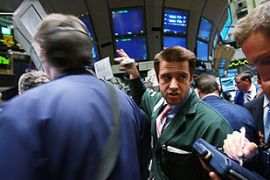Stocks climb on hopes of US bailout
European and Asian indices regain some ground in advance of US senate vote on revised rescue plan.

The amended bill includes an increase in the amount of bank deposits protected by the government’s insurance programme.
Bourses steady
Asian markets also regained on Wednesday some of the ground they lost on the previous day, after Wall Street rallied on hopes that a US rescue package will be passed.
Japan’s benchmark Nikkei index climbed more than one per cent in early trade on Wednesday, despite the Bank of Japan’s Tankan corporate survey indicating that Japanese business sentiment had turned pessimistic for the first time in five years.
| IN DEPTH |
|
Economic analysis of bailout rejection Fighting against US foreclosures |
On Tuesday, the Nikkei had dived 4.1 per cent to a three-year closing low.
South Korea’s Kospi index was weaker and markets in Hong Kong, Shanghai and Singapore were closed for holidays on Wednesday but share prices in Taiwan, Australia and New Zealand climbed.
But Song Seng Wun, a regional economist with CIMB-GK Research in Singapore, said that a rebound in stock markets was “not really” the best measure of financial health.
Investors were “taking things day by day” and taking their lead from Wall Street, waiting to see whether help was on the way for the US economy, he told Al Jazeera.
Song said that liquidity was still an issue as until there was greater clarity on a financial plan or on the health of the global financial system, financial institutions were essentially “hoarding cash”, lending only to their “most trusted friends”.
Modified bill
The White House on Tuesday welcomed “the progress made” towards a modified bailout bill.
And Republican and Democratic leaders in the House of Representatives expressed hope the revised bill would pass in that chamber.
| IN VIDEO | ||
|
Republican house members voted against the rescue package on Monday by a more than 2-to-1 margin. A majority of Democrats voted in favour.
Speaking to Al Jazeera on Wednesday, Allister Heath, editor of City AM, a London-based business publication, said: “I think the only good news is that even if the rescue package does not go through, it is not the end of the world.
“All over the world, governments have been taking their own action; banks have been sold and bought, sometimes nationalised. There have also been private-sector solutions.
“Optimism has returned to the trading floors here in London and also on Wall Street, but it is very hard to predict whether a plan will be passed by both houses of the US congress. The problem is that the left and the right tend to disagree [on the rescue package] The left think it is bailing out big banks while the right see it as a form of socialism.”
Heath said even if the rescue plan goes through, the problem of the credit crunch will not go away.
“It is merely another weapon to tackle the problem,” he said.
“Basically, the credit crunch is getting worse; many more banks will have to be rescued and hundreds of billions of bad debt is going to have to be written off. Stock markets will continue to fall, property prices will continue to fall. All over the world, consumers and savers will suffer.”
Time for pragmatism
David Buick, from BCG Partners in London, said that now was the time for pragmatism, not recriminations.
“The fact is we have a problem and I don’t think that those people who voted against it know the implications,” he told Al Jazeera.
“The banking sector is the lifeline, the best artery … to the fabric of every society in the world. Without strong banks we have nothing, we have a dilapidated economy worldwide, we have no retail, we have unemployment, we have anarchy.”
The effects of the crunch are already being felt by Americans from upmarket boutiques to neighbourhood grocery shops.
Some economists say if congress does not pass the bailout package soon, it will be just weeks before businesses on New York City’s Fifth Avenue start emptying of customers.
As a result, the average American may soon find themselves unemployed and without credit.
Feeling the pain
Small business such as the Jefferson Market, in Manhattan, will be among the first to fall.
Angelo Montuori, who owns a grocery shop in the market, says his store is almost empty most days.
He says that after a very slow summer, he does not have the money to re-stock and is looking to the banks for help.
“If we get the credit, we get the merchandise, I think everything will work out fine. Most of out customers are loyal here. They come in now and say I hope you make it,” Montuori told Al Jazeera.
“The problem is, bankers aren’t lending new money in case they don’t get it back as more and more businesses are beginning to show signs of failing.”
“If we can’t get the merchandise it will be very difficult … and we need a lot of merchandise.”

